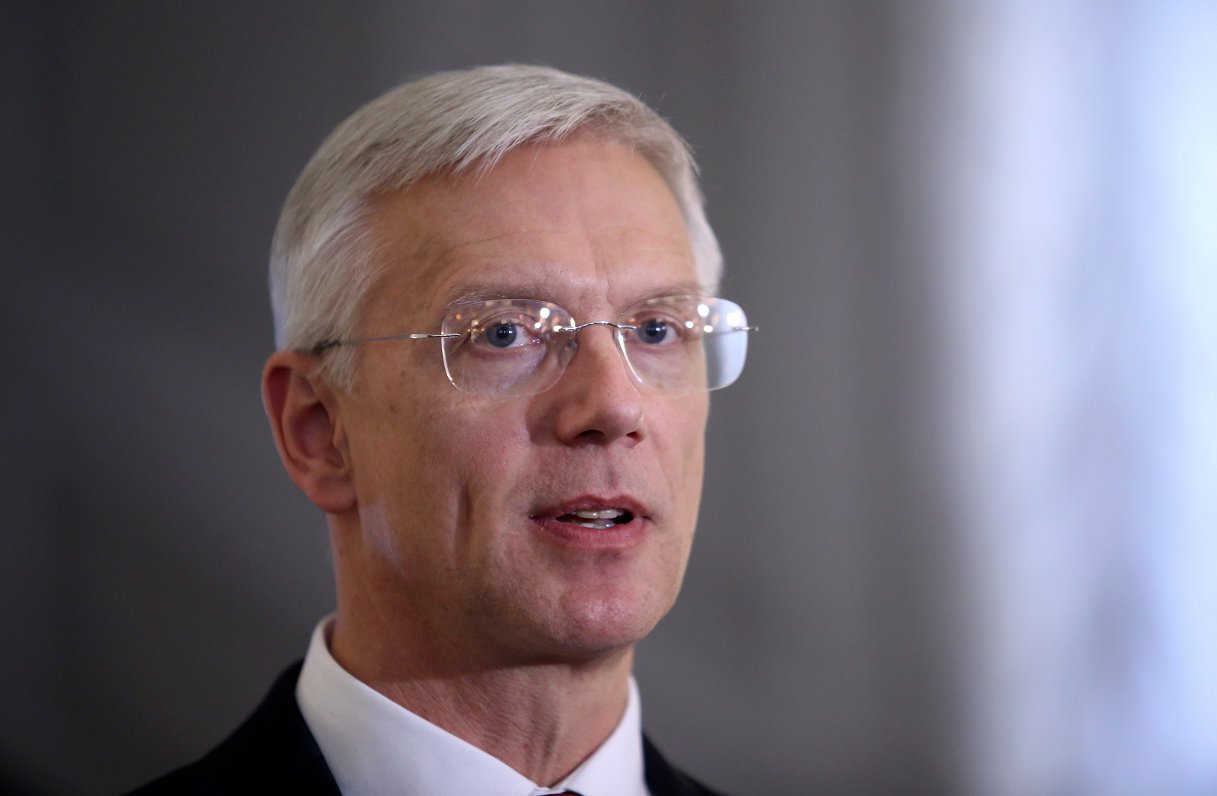Vējonis made the announcement after a meeting with Kariņš at Rīga Castle three days after talks with political parties strongly suggested the nomination would be forthcoming.
"I invite Krišjānis Kariņš to form a ministerial cabinet," Vējonis said, adding that doing so "is not a simple matter" given the various promises made by parties during their election campaigns leading up to the October 6 vote that returned a new Saeima.
Valsts prezidents @Vejonis aicina partiju apvienības @Jauna_Vienotiba Ministru prezidenta amata kandidātu @krisjaniskarins sastādīt valdību https://t.co/OyoCo9MRbi pic.twitter.com/FKxcVuUgyR
— Valsts prezidents (@Rigas_pils) January 7, 2019
Kariņš will now need to formalize the support of other parties by drawing up a coalition agreement and government action plan, as well as outlining his proposed distribution of ministerial portfolios. His proposed government will include five parties: his New Unity party, the New Conservatives, KPV LV, the National Alliance and For Development/For!
Accepting the nomination, Kariņš said he would have preferred a six-party coalition [to include the Greens and Farmers' Union of caretaker prime minister Māris Kučinskis] but that as this was not possible due to objections from other parties, the five-party model will be the way ahead.
He said it would be "unprecedented that the smallest faction in Saeima receives the invitation to form a government but the reasons why this has happened are because of the objections voiced between other parties. I am now the candidate that the other parties have talked about and agreed upon."
He also said that the priorities of his government would be the dame as those discussed in recent weeks, namely rapid reform of the financial sector in line with recent Moneyval recommendations, fighting against corruption, pursuing education reform, liquidation of a controversial surcharge on electricity bills and improving healthcare.
Kariņš, a member of the New Unity party, is the third person nominated for the post of prime minister by the president. The first nominee was Jānis Bordāns of the New Conservative party. Despite initial optimism, his attempt to form a coalition foundered as party rivalries surfaced in subsequent talks.
Second up to bat was Aldis Gobzems of the KPV LV party. His candidacy was highly controversial and a series of bizarre events led to him proposing a government made up of unelected "experts" under him whom he never named but repeatedly assured would be "the best of the best". Unsurprisingly, the other parties did not respond well to his off-the-wall antics and his candidacy was withdrawn by the president, who attracted considerable criticism for nominating him in the first place.
Kariņš, born in 1964, is currently serving as an MEP. He was born in the United States and moved to Latvia in the mid-1990s. He served as Economics Minister 2002-2004 and became an MEP in 2009.
Formerly the dominant force in recent government coalitions, New Unity saw its parliamentary representation reduced by two thirds in October's election and it is now the smallest party in Saeima. With the rest of the Saeima seats distributed between six other parties, most with fairly similar numbers of seats, Kariņš will hope to take the role of honest broker between the competing interests.
Nevertheless, if Latvia does wind up with a prime minister from the smallest party in Saeima, after three months of negotiations about finding an acceptable candidate, it will underline the fragmented nature of politics in the country at present and Kariņš will have his work cut out to keep the rivalries under control that have bubbled throughout the government formation process.
Government formation must be confirmed by a Saeima vote which is likely to take place within the next few weeks. This should be a formality given that the coalition outlined would control 66 of 100 Saeima seats.
Kariņš outlined the proposed shape of his cabinet:
Foreign Minister: Edgars Rinkēvičs (New Unity)
Finance Minister: Jānis Reirs (New Unity)
Justice Minister: Jānis Bordāns (New Conservatives)
Transport Minister: Tālis Linkaits (New Conservatives)
Education and Science Minister: Ilga Šuplinska (New Conservatives)
Economics Minister: Dīdzis Šmits (KPV LV)
Interior Minister: Sandis Ģirģens (KPV LV)
Welfare Minister: Ieva Krapāne (KPV LV)
Defense Minister: Artis Pabriks (For Development/For!)
Environment and Regional Affairs Minister: Jūris Pūce (For Development/For!)
Health Minister: Ilze Vinkele (For Development/For!)
Culture Minister: Dace Melbārde (National Alliance)
Agriculture Minister: Kaspars Gerhards (National Alliance)
Four of the potential ministers named hold ministerial portfolios in the outgoing coalition. Others, such as Pabriks and Vinkele have previously held ministerial office. Ģirgens of KPV LV and Vinkele of For Development/For! have not been elected to parliament, but ministers do not necessarily have to have been elected to be appointed.




























